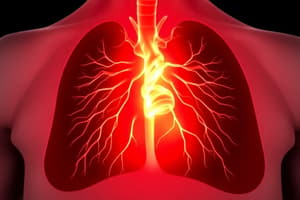Podcast
Questions and Answers
What is the primary function of blood vessels in the body?
What is the primary function of blood vessels in the body?
- To regulate body temperature
- To control the flow of blood by constricting and dilating (correct)
- To produce red blood cells
- To store excess blood volume
What happens when blood vessels lose their ability to constrict?
What happens when blood vessels lose their ability to constrict?
- No change in blood pressure
- An increase in blood pressure
- Formation of blood clots
- A decrease in blood pressure (correct)
In distributive shock, what happens to the capacity of the vascular system?
In distributive shock, what happens to the capacity of the vascular system?
- It decreases
- It remains the same
- It narrows
- It increases (correct)
What is another term used for relative hypovolemic shock?
What is another term used for relative hypovolemic shock?
What causes psychogenic shock?
What causes psychogenic shock?
What happens to blood circulation in psychogenic shock?
What happens to blood circulation in psychogenic shock?
What is the primary cause of cardiogenic shock?
What is the primary cause of cardiogenic shock?
Which type of shock occurs when something physically obstructs the heart from filling or emptying effectively?
Which type of shock occurs when something physically obstructs the heart from filling or emptying effectively?
What causes septic shock?
What causes septic shock?
What distinguishes anaphylactic shock from other types of shock?
What distinguishes anaphylactic shock from other types of shock?
Which type of shock results from a rapid loss of blood due to hemorrhaging?
Which type of shock results from a rapid loss of blood due to hemorrhaging?
What is the cause of obstructive shock?
What is the cause of obstructive shock?
What type of shock is neurogenic shock classified as?
What type of shock is neurogenic shock classified as?
During compensated shock, what happens to the body's blood vessels?
During compensated shock, what happens to the body's blood vessels?
Which of the following is a characteristic of the decompensated stage of shock?
Which of the following is a characteristic of the decompensated stage of shock?
Why does a patient's skin become pale and cool during compensated shock?
Why does a patient's skin become pale and cool during compensated shock?
What effect does respiration have during compensated shock?
What effect does respiration have during compensated shock?
What is the general term for shock resulting from an insufficient volume of blood circulating in the body?
What is the general term for shock resulting from an insufficient volume of blood circulating in the body?
Which position is sometimes referred to as the Trendelenburg position or shock position?
Which position is sometimes referred to as the Trendelenburg position or shock position?
What is not indicated for a patient if they have experienced trauma putting stress on the cardiovascular system?
What is not indicated for a patient if they have experienced trauma putting stress on the cardiovascular system?
What are common symptoms when the body's compensatory mechanisms fail and tissues begin to become hypoxic?
What are common symptoms when the body's compensatory mechanisms fail and tissues begin to become hypoxic?
What is a potential consequence of decreased oxygen flow to the brain during shock?
What is a potential consequence of decreased oxygen flow to the brain during shock?
What is a characteristic of irreversible shock according to the text?
What is a characteristic of irreversible shock according to the text?
How can you help a patient in shock maintain a normal body temperature?
How can you help a patient in shock maintain a normal body temperature?
What is the final outcome of the body's attempt to compensate for severe blood loss?
What is the final outcome of the body's attempt to compensate for severe blood loss?
Which organ stops functioning effectively due to hypoxia in a person experiencing shock?
Which organ stops functioning effectively due to hypoxia in a person experiencing shock?
What should be provided to a patient experiencing shock to address the underlying hypoxia?
What should be provided to a patient experiencing shock to address the underlying hypoxia?
What happens to the patient when cardiac arrest occurs?
What happens to the patient when cardiac arrest occurs?
Why is it important to rapidly transport a patient showing signs of shock to an advanced care facility?
Why is it important to rapidly transport a patient showing signs of shock to an advanced care facility?
What type of shock is caused by severe infections creating poisons in the body?
What type of shock is caused by severe infections creating poisons in the body?
Flashcards are hidden until you start studying



